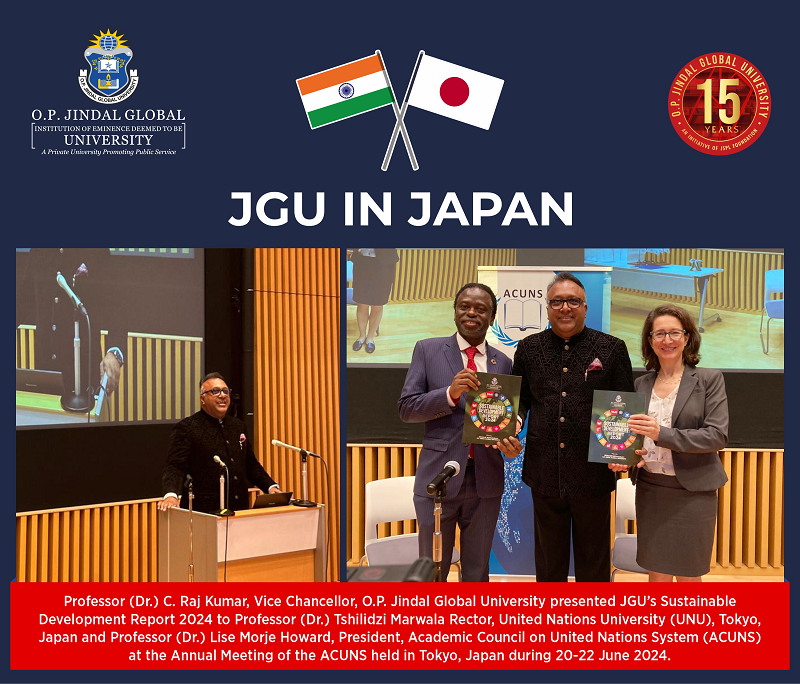Government Cooperation for Water Security
JGU Vice Chancellor at ACUNS meet in Tokyo

The Founding Vice Chancellor of JGU, Professor (Dr.) C. Raj Kumar, addressed the prestigious Annual Meeting of the Academic Council of the United Nations System (ACUNS) held in Japan during June 20-21 and delivered the keynote speech.
In his speech titled ‘The Role of Universities in the Global South for Achieving the Sustainable Development Goals (SDGs)’, Dr. Raj Kumar outlined how critical it was to achieve the ambitious Agenda 2030 in the remaining six years and how important it is for all stakeholders, governments and corporations to undertake strategic policies and actions to contribute directly to the fulfilment of the SDGs and solve pressing global issues. “It is essential that knowledge production and distribution, innovation, cutting-edge research, interactive learning, and capacity building are enhanced for human development and universities and other higher education institutions can be a key platform to realise the fruitful conclusion of these important and demanding tasks,” he said.
He said: “Universities in India and the Global South can contribute to the achievement of all the 17 SDGs in 10 main points. The primary role of universities is to empower students to become changemakers by embedding relevant themes and challenges within the curricula while focusing on experiential learning, clinical programmes, capstone projects, and community level engagement. To break the vicious cycle of poverty, it is essential to provide financial aid and scholarships, promote philanthropy, and provide policy recommendations to the government to invest in public education. To ensure equality for all, institutions have the dual responsibility to be microcosms of equal opportunity, fair practice, and an inclusive centre of learning as well as workplace. Universities contribute to achieving the goal of good health and well-being through generation of knowledge and scholarship on healthcare, and raising awareness through community engagement.
“Furthermore, to take action towards preservation of life on earth and climate change, universities should invest in research on environment and engage with indigenous cultures about sustainable practices, and act as change agents by reducing carbon footprint and creating sanctuaries within campuses for biodiversity preservation. Universities can nurture individual consciousness towards sustainability through curriculum, research agendas, sustainable infrastructure, campus engagement, public institutional engagement, and institutional environmental footprint. To work towards the goal of clean water and food security, universities must utilise their maximum potential to positively impact public policy, and improve water management and food security practices within their own premises. For sustainable economic growth of people and industries, universities need to design dynamic curriculum relevant to market changes, collaborate with industries, and act as incubators for innovation and entrepreneurship. To advocate for peace and justice, educational centres must uphold academic freedom and objectively portray diverse perspectives and truths without external interference or censorship to inculcate awareness within the social and political psyche of people. To work towards partnership, especially South-South cooperation, universities can create consortiums, research networks, address common challenges, promote cultural exchange, and influence policy change,” Professor (Dr.) Kumar said.
We actively collaborate with local and state authorities, including the Haryana Water Resources Authority, to ensure our water practices align with regional conservation goals.
Through transparent reporting, data sharing, and policy alignment, we innovate responsibly and contribute to long-term water resilience for both our campus and surrounding communities. These partnerships amplify our impact and help us meet ambitious sustainability goals.




